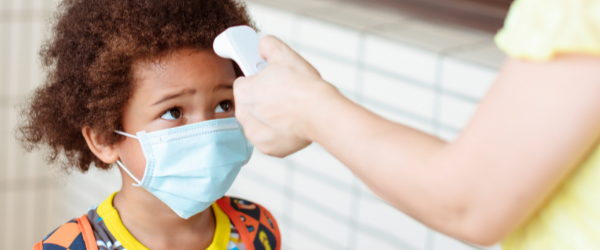For many parents, the end of summer is cause for celebration. After a summer of playing entertainment director and hearing "I’m so bored” a zillion times, back to school is cause for celebration.
Wait. That was the end of the summer prior to 2020. This is post-COVID (almost) 2021. Your parent turned teacher role amidst “work from home” Zoom meetings were rough at first, but everyone adapted and began to look (a little) forward to spending time together. COVID, for many families, was a period of bonding.
But as we know, all good things must come to an end, and after a year away from school, many kids are feeling anxious about going back to school and meeting up with old friends or making new ones.
As a super-parent-teacher-counselor, you have the power to help your child transition back to school with more anticipation and less anxiety.
COVID, Mental Health & More Questions than Answers
As adults, we may recognize how difficult it is to manage life inside a pandemic, but we tend to forget kids have a plate full of “what do I do now” too. Daily life for school-age children changed dramatically in a split second. Playground tag and lunch with friends and kidding around in class disappeared and were replaced with…well, nothing.
Social interaction is a critical part of a child’s development, and in their world, school is the primary place where friendships are made, and interaction occurs. Getting up and going to school every morning gives them a sense of meaning, a purpose for getting out of bed. When you take those connections away, it leaves many feeling like their life is meaningless.
Sadness begins to take form, and depression sets in. They are lonely and unsure of what the world has in store for them and may withdraw altogether.
"As adults, we sometimes forget how hard it was being an adolescent. When we see a kid who is just miserable at school, we might think they choose to be that way – or that it’s just part of adolescence. But in fact, they might be in a mental health crisis, one they certainly did not choose and do not want. When a teacher says “how can I be helpful,”
that is a powerful question. ”–Alyssa Fruchtenicht, School-Based Mental Health Counselor
.png?width=1826&name=Help%20Others%20(1).png) There has been a 10 percent increase in young people going to the emergency room with concerns about suicide or who have actually attempted suicide. Now the sad and anxious kids are headed back to school, to teachers who are not trained mental health providers. Parents and teachers can learn the early warning signs of emotional distress and take action.
There has been a 10 percent increase in young people going to the emergency room with concerns about suicide or who have actually attempted suicide. Now the sad and anxious kids are headed back to school, to teachers who are not trained mental health providers. Parents and teachers can learn the early warning signs of emotional distress and take action.
8 signs to be on the lookout for:
- Significant changes in sleeping and eating
- Persistent physical symptoms like headaches or stomach aches without known physical cause
- Increased tearfulness or emotional outbursts
- Emergence of new fears
- Withdrawal from activities that are still available
- Risky behaviors like smoking, vaping, drinking, as well as concerning online behavior
- Resistance to following guidelines your family has established for safety
- Preoccupation with the news
Will attending school ease the sadness? Maybe being among peers will help kids bounce back, or maybe after a year of near solitude, trying to make friends will be overwhelming. Has the pandemic reshaped child development? It could be years before life returns to pre-covid status, and the adverse effects on well-being could cause lingering trauma that redefines normal childhood development.
The most important role you play in your child’s life is one of safety. Reassure your child that adults are taking the lead to establish their safety. Even if you don’t have all the answers yet.
How to Help Children Build Resiliency & Cope with Anxiety
Children are inherently resilient. As long as they know the rules, they adapt quickly to whatever scenario plays out in front of them. The sooner “normal” can resume, the less likely there will be any long-term effects on their mental health.
Establish a routine
One of the quickest ways to ease a child’s anxiety is to re-establish routines. Having a routine makes children feel safer and happier, which leads to better cooperation. When your child knows what to expect and what’s expected of them they are more confident about what lies ahead.
If your child is distance or hybrid learning, it will be helpful to establish a routine that is similar to what they would experience in an in-person school setting. An after-school routine that leads into a nighttime routine is a great way to help your child wind down after the day and prepare for tomorrow.
Younger children may have a difficult time separating from their parents again. This could look like tantrums when separating, problems sleeping alone or refusal to attend without parents. A fun morning routine that puts a smile on your child’s face could be the recipe for a successful day.
Validate Their Concerns
Acknowledge that starting school can be scary like any new activity, but it soon becomes easy and fun, just like sliding down the giant kid slide. Validating their feelings lets them know that it’s ok they feel the way they do and that you understand. However, don’t dwell on the negativity.
Once you have validated their feelings, help them think of something they can do about how anxious they feel. Be positive and discuss fun things they may do at school.
Regardless of how your child behaves as the start of school draws near, you need to stay calm and positive. If they say they don’t want to go and they will miss you, tell them, “I know. I will miss you too, but I think it is wonderful you are going to school.”
WATCH THIS VIDEO FOR AN AFTER SCHOOL HEALTHY SNACK IDEA
Be Flexible
No one knows when this pandemic will die. One day you wear a mask. The next day you don’t…then you do again. You can gather with family. Then you can gather with friends. Then you must stay home. Again. Tomorrow you go to school, but next week you’ll be learning remotely.
Let your child know there is a lot of uncertainty right now. What works today may not work tomorrow, and things will have to change. Discuss the importance of being flexible but also let them know you will pass on information as soon as you get it.
Doing so will also keep them coming to you with their questions so you can make sure they have all the information they need and that it is accurate.
Never make blanket statements such as “you don’t need to worry about it” or “It will be just fine.” This does the opposite of reassuring your child everything is ok. Instead, it tells them you don’t have time
to be bothered with their fears.
When to Get Help
Most kids have the first day of school jitters but are also eager to get back to school. For kids who have trouble separating from their parents, they usually need a little time to adjust.
However, if after the first 3-4 weeks of school, your child is still throwing a tantrum every morning when it’s time to get dressed for school, seeking help from both a therapist and the teacher could make a big difference.
Remember, your child looks to you for clues on how to feel and what to say. If they see you are overwhelmed and anxious, they will likely follow your lead and feel that way too.
Dealing with anxiety and stress limits your child's ability to adjust to their environment and learn new things. Work through your concerns together so you can get back that little happy dance you do at the end of the summer when the kids go back to school. Here are some positive parenting tips.
When you partner with Ulliance, our Life Advisor Consultants are always just a phone call away to teach ways to enhance your work/life balance and increase your happiness. The Ulliance Life Advisor Employee Assistance Program (a total Well-being Program) can help employees and employers come closer to a state of total well-being.
References:
5 Tips to Ease Back-to-School Anxiety. (n.d.). Retrieved from John Hopkins Medical: https://www.hopkinsmedicine.org/health/wellness-and-prevention/5-tips-to-ease-backtoschool-anxiety
Back-to-School Resources for Families and Educators. (2021). Retrieved from Child Mind Institute: https://childmind.org/backtoschool/
Brundin, J. (2021, April 5). 'All Kinds Of Trauma’: Students Are Returning To School, But Are We Ready To Help Them Cope? Retrieved from CPR News: https://www.cpr.org/news/
LCSW, K. H. (n.d.). How to Cope With Back-to-School Anxiety. Retrieved from PBS for Parents: https://www.pbs.org/parents/thrive/how-to-cope-with-back-to-school-anxiety
Miller, C. (2021). Back-to School Anxiety During COVID - How to help kidshandle fears and gain independence. Retrieved from Child Mind Institute: https://childmind.org/article/back-to-school-anxiety-during-covid/
Santhanam, L. (2020, December 16). How to help kids build resilience amid COVID-19 chaos. Retrieved from PBS: https://www.pbs.org/newshour/health/how-to-help-kids-build-resilience-amid-covid-19-chaos


